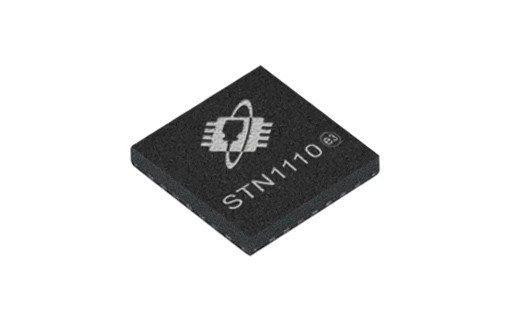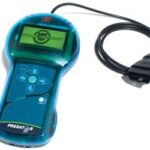The Stn1110 Obd2 Scanner IC stands out as a cutting-edge multiprotocol OBD to UART interpreter, designed to empower next-generation vehicle diagnostic tools. While OBD Solutions now directs new projects towards the STN2100, the STN1110 remains a robust and highly capable solution for accessing critical vehicle data. This includes diagnostic trouble codes, MIL status, VIN, Inspection and Maintenance (I/M) information, In-use Performance Tracking (IPT), and a vast array of real-time parameters essential for comprehensive vehicle analysis.
The STN1110 is engineered to be fully compatible with the ELM327 command set, ensuring seamless integration with a wide range of existing OBD2 scanner software applications. However, it significantly outperforms the original ELM327 IC in key areas such as stability, processing speed, and feature richness, making it an ideal component for advanced OBD2 scanners.
Unmatched Performance for OBD2 Data Processing
At the heart of the STN1110 lies a powerful 16-bit processor, delivering significantly faster performance compared to its competitors. This enhanced processing capability translates directly into superior data throughput, allowing OBD2 scanners built with the STN1110 to retrieve and process vehicle data at speeds up to 100% faster. This rapid data acquisition is crucial for real-time diagnostics and applications that demand high-frequency data sampling.
Furthermore, the STN1110 supports UART baud rates up to an impressive 10Mbps. This is 20 times faster than the quickest OBD protocol, ensuring that data transfer bottlenecks are minimized, and your OBD2 scanner operates at peak efficiency.
Advanced Features for Enhanced OBD2 Scanning
The STN1110 OBD2 scanner IC is packed with features designed to enhance the functionality and reliability of diagnostic tools:
- Secure Bootloader: Benefit from a safe and secure bootloader that allows for firmware reflashing in the field. This critical feature simplifies updates and maintenance, even over unreliable connections, and helps to avoid costly product recalls.
- ELM327 Command Set Compatibility: Enjoy out-of-the-box compatibility with the widely adopted ELM327 command set. This ensures that OBD2 scanners built around the STN1110 can seamlessly work with numerous existing software applications, saving development time and broadening compatibility.
- Extended “ST” Command Set: Unlock advanced functionalities with the extended “ST” command set. This provides access to enhanced features without sacrificing compatibility with standard ELM327 commands, offering a flexible and powerful platform for sophisticated OBD2 scanner applications.
- PowerSave Mode: Implement efficient power management with the integrated PowerSave mode. Featuring multiple sleep and wakeup triggers, this mode is perfect for OBD2 scanners designed for permanent in-vehicle installation. Devices can remain connected for extended periods without risking battery drain, ideal for telematics and continuous monitoring applications.
- Versatile Form Factor: The STN1110 is available in SPDIP, SOIC, and QFN packages, providing a perfect form factor for integration into any OBD2 scanner design, regardless of size or complexity requirements.
Broad Protocol Support for Comprehensive Vehicle Compatibility
The STN1110 OBD2 scanner IC offers extensive protocol support, ensuring compatibility with a wide range of vehicles:
- All Legislated OBD II Protocols:
- ISO 15765-4 (CAN)
- ISO 14230-4 (Keyword Protocol 2000)
- ISO 9141-2 (Asian, European, Chrysler vehicles)
- SAE J1850 VPW (GM vehicles)
- SAE J1850 PWM (Ford vehicles)
- Non-Legislated OBD Protocols:
- ISO 15765
- ISO 11898 (raw CAN)
- SAE J1939 OBD Protocol: Support for heavy-duty vehicles using the SAE J1939 protocol, expanding the application range of OBD2 scanners built with STN1110.
Unwavering Stability for Reliable OBD2 Scanning
Stability is paramount in vehicle diagnostics, and the STN1110 OBD2 scanner IC is engineered for dependable performance:
- Field-Tested Software: The STN1110 runs proven software, the same robust code that powers the renowned OBDLink family of PC-based OBD interfaces. This mature codebase benefits from extensive real-world testing and user feedback, ensuring rapid identification and resolution of any potential issues.
- Large OBD Message Buffer: Equipped with significantly more RAM than competitors, the STN1110 virtually eliminates BUFFER OVERFLOW errors. This large message buffer is critical for handling bursty OBD data and ensuring reliable data capture, especially in complex vehicle systems.
- Automatic Protocol Detection: The continuously refined automatic protocol detection algorithm ensures that STN1110-based OBD2 scanners connect to the widest possible range of vehicles. This includes vehicles that may not strictly adhere to the OBD standard, maximizing compatibility and ease of use.
Cost-Effective Solution for High-Performance OBD2 Scanners
Choosing the STN1110 OBD2 scanner IC translates to significant cost savings. It offers superior performance and features at a price point that can save up to 200% compared to competing solutions. Generous volume discounts further enhance cost-effectiveness for larger deployments and production runs.
For developers and manufacturers seeking a high-performance, reliable, and cost-effective OBD2 scanner IC, the STN1110 remains a compelling choice, despite the availability of newer alternatives.
Resources for STN1110 OBD2 Scanner Development
Explore these resources for in-depth information and development support for the STN1110 OBD2 scanner IC:
- STN1110 Datasheet
- STN1100 Family Reference and Programming Manual
- STN11xx PowerSave Functionality
- STN1110 Press Release
- Firmware Update Specification for Devices with STN Bootloader
- STN1110 vs. ELM327 Comparison
While the STN2100 is recommended for new designs, the STN1110 OBD2 scanner IC continues to be a powerful and cost-effective solution for a wide range of vehicle diagnostic applications.


